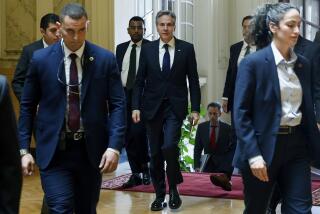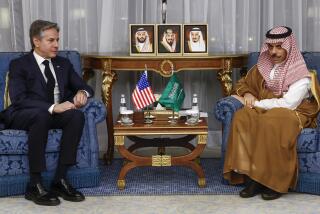Reagan Likely to Meet Arabs : May Discuss Peace With Hussein, Mubarak
WASHINGTON — President Reagan probably will meet later this month with King Hussein of Jordan and President Hosni Mubarak of Egypt in an effort to restart the stalled Middle East peace process, Administration officials said Thursday.
In addition, the officials said, Reagan probably will confer in October with Israeli Prime Minister Shimon Peres.
All three Mideast leaders are planning to attend sessions of the U.N. General Assembly in New York. Hussein and Mubarak are scheduled to address the opening session of this year’s assembly in late September, while Peres plans to attend a special 40th anniversary meeting next month.
“I would be willing to bet next month’s salary that the President will see them,” one official said. “I do not see how he could avoid such a meeting if they are in the United States.”
Although the official said no final decisions have been made on U.S. strategy for the meetings, Reagan presumably will attempt to pump new life into the peace process after an unproductive visit to the region last month by Richard W. Murphy, assistant secretary of state for Near Eastern and South Asian affairs.
Hussein and Palestine Liberation Organization Chairman Yasser Arafat agreed last February to pursue a joint strategy for peace negotiations with Israel. The Jordanian monarch later said he was prepared for face-to-face talks with the Israelis and that Arafat was prepared to accept two key U.N. Security Council resolutions asserting Israel’s right to exist within internationally recognized boundaries once the talks begin.
Hussein also called for a preliminary meeting between Murphy and a Jordanian-Palestinian delegation whose Palestinian members would be selected by Arafat but need not be members of the PLO.
The king sent Washington the names of seven potential Palestinian delegates, and Murphy said that “some” of them were acceptable; Peres said Israel would have no objection to talking to two of them. However, arrangements for the meetings have bogged down.
In Jerusalem on Wednesday, leaders of the American Jewish Congress said top Egyptian and Jordanian officials have urged that the Reagan Administration “put (the PLO) to the test” by agreeing to meet with the Jordanian-Palestinian delegation. The Americans spoke after having met with Mubarak in Cairo and Hussein in Amman.
They said the Arab leaders “broadly hinted” that if Arafat still failed after the meeting to recognize Israel and renounce terrorism, they would be ready to seek a broader peace with Israel without PLO participation.
Jordan also wants to buy about $1-billion worth of U.S. arms. The king has said he needs the weapons for national security and, perhaps more important, considers such a sale to be a sign of U.S. political support.
Secretary of State George P. Shultz has made it clear that the Administration wants to transfer the weapons, including jet aircraft and anti-aircraft missiles, to Jordan, but substantial opposition to the sale has built up in Congress--and Israel is adamantly opposed.
Shultz briefed members of the Senate Foreign Relations Committee during a closed session Thursday. A spokesman for committee Chairman Richard G. Lugar (R-Ind.) said “nothing definite” was said about either the Middle East peace process or the proposed arms sale plan.
More to Read
Sign up for Essential California
The most important California stories and recommendations in your inbox every morning.
You may occasionally receive promotional content from the Los Angeles Times.










